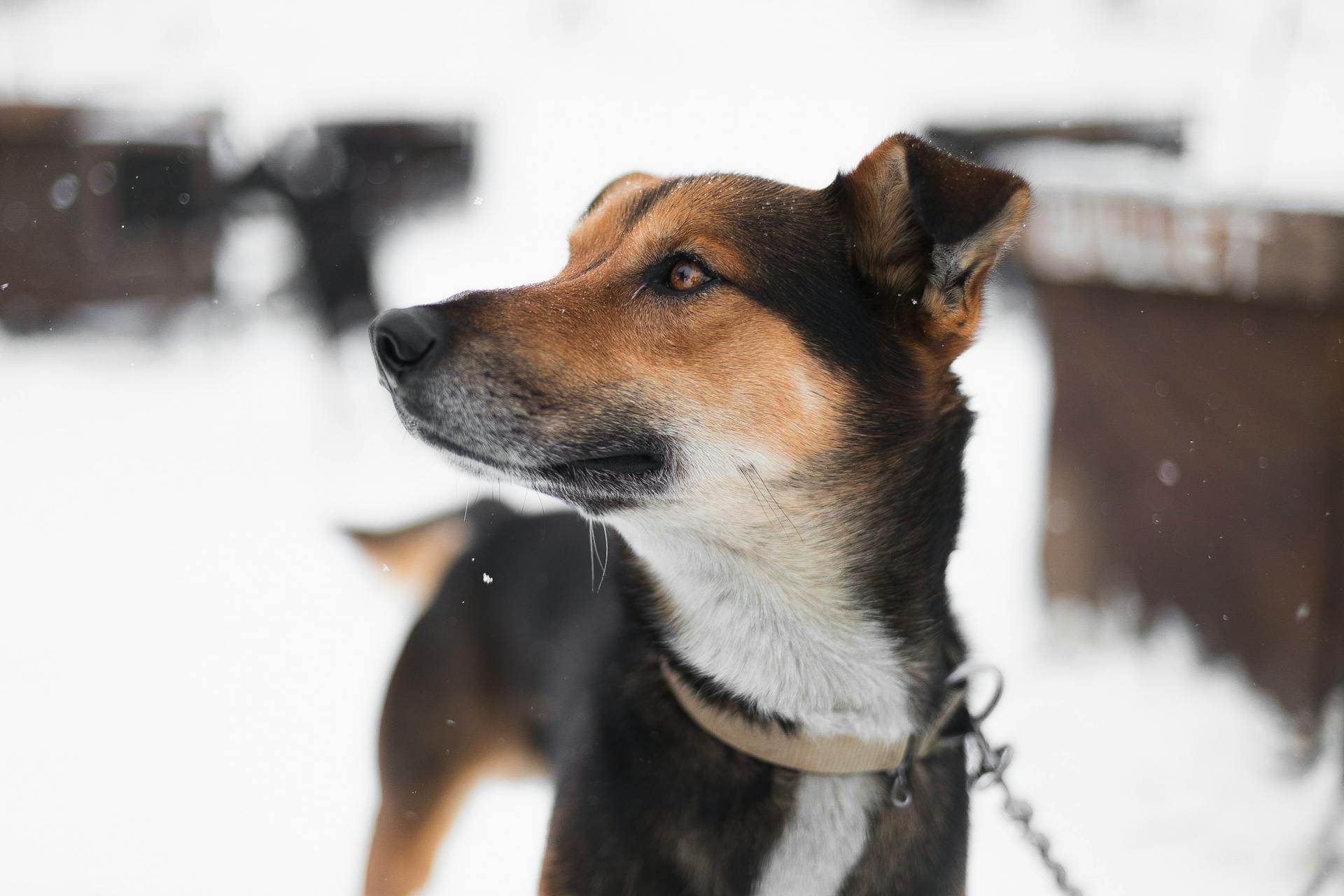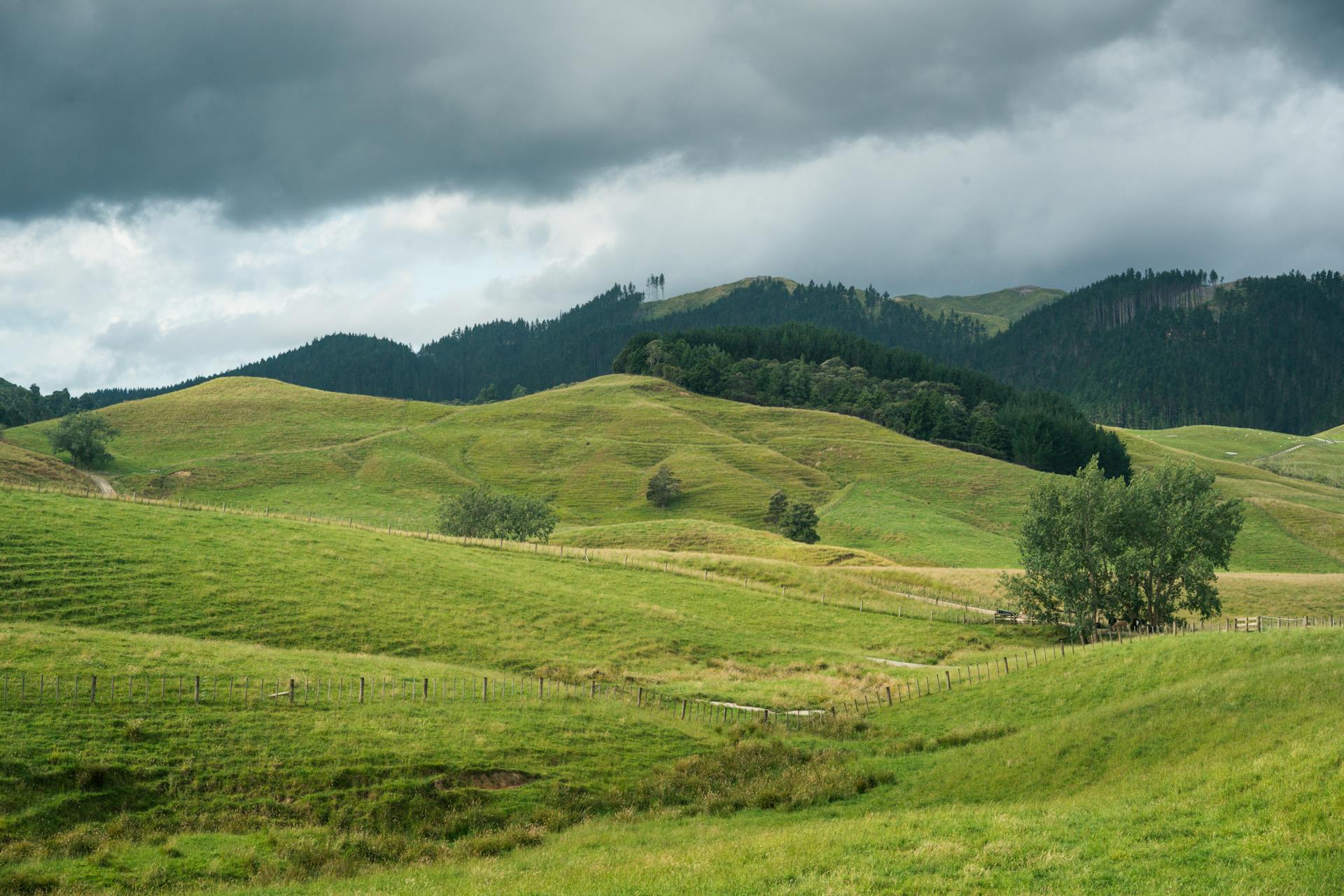
The NZ Huntaway Dog is a breed that's as intelligent as it is energetic. They're bred to herd cattle, so they're naturally good at following commands and working in teams.
Originating in New Zealand, this breed has been developed over the years to be a highly effective and versatile herding dog. They're known for their strong work ethic and ability to learn quickly.
NZ Huntaways are medium-sized dogs with a muscular build, weighing between 30-45 kg. They're also known for their distinctive appearance, with a short, smooth coat that's usually black, tan, or a combination of both.
Their intelligence and energy levels make them a great breed for active owners who are willing to put in the time and effort to train and exercise them regularly.
Discover more: Breeds of Dogs in New Zealand
History and Recognition
The Huntaway breed has a rich history that dates back to the late 19th century, with the first written records of the breed appearing in 1870 in the Upper Waitaki region.
Early farmers in New Zealand developed the breed in response to the vast pastoral runs or "stations" that required teams of dogs to work mustering for days on end. The breed was developed by crossing British sheepdogs with other breeds that had desirable traits such as size, stamina, and a steady barking ability.
The Huntaway was further developed as a separate breed from the heading dog during the 20th century.
History
The Huntaway breed has a rich history that dates back to the late 19th century. The earliest references to Huntaways are in the late 19th century, with a sheepdog trial with a specific class for Huntaways advertised in the Upper Waitaki in 1870.
Initially, British sheepdogs were used by New Zealand farmers, but they mostly worked silently. However, some farmers liked the characteristic of a dog that would use its bark to herd sheep.
In the early days, Collies and other working sheepdogs with the barking trait were crossed with other breeds to create the Huntaway. The exact lineage is not known, but it's believed that breeds such as the Border Collie, Beauceron, German Shepherd, Labrador, and Rottweiler were used.
Suggestion: What Do Service Dogs Help with

The Huntaway was further developed as a separate breed from the heading dog during the 20th century. The breed was recognized by the New Zealand Kennel Club in 2013, but its exact origin and history remain a mystery.
The Huntaway's loud bark is a unique characteristic that sets it apart from other herding breeds. This trait is useful on very hilly land, where the farmer and dog may disappear from each other's sight.
The breed was initially bred by farmers to withstand the terrain of New Zealand's high country. They needed a dog that could cover great distances on rough, steep country, and the Huntaway fit the bill.
The Huntaway has found a fanbase among farmers and stockmen worldwide, thanks to its intelligence, herding skills, and reliability. They are also gaining popularity as a working breed in other countries, including Australia and Great Britain.
Related reading: Sheep Dog Herding
Breed Recognition
The Huntaway breed has a unique history of recognition. It wasn't until 2013 that the New Zealand Kennel Club (NZKC) recognized the breed, making it the first dog breed of New Zealand origin to be recognized.
Readers also liked: New Legendary Dogs Pokemon
The NZKC has a standard for the Huntaway breed, but it notes that the breed's appearance is not a priority. In fact, the breed's appearance can vary greatly, with no uniform standard.
The Huntaway's working ability and health are what matter most, not its appearance. Breeders should focus on these qualities when breeding a Huntaway, rather than trying to create a specific look.
The Huntaway is not a breed that can be shown in a traditional sense, due to its varied appearance. However, it is recognized by the NZKC, and its working ability is what sets it apart from other breeds.
As of 2013, the Huntaway breed is recognized by the NZKC, marking a significant milestone in its history.
For another approach, see: Huntaway
Famous
The Huntaway breed has a strong reputation within its native New Zealand. In fact, there is a well-known Huntaway dog monument in Hunterville.
Health and Grooming
The New Zealand Huntaway is a hardy breed with relatively few health issues, but like all breeds, they can be prone to certain conditions. They tend to live into their early teens, which is a testament to their robust health.
For another approach, see: Dental Health Diets for Dogs
One genetic condition that has been well studied in the breed is Mucopolysaccharidosis type IIIA (MPS IIIA), a rare metabolic disorder that affects the production of an enzyme called heparan sulfate sulfamidase (SGSH). This condition results in neurological abnormalities and affected dogs should never be bred from.
Hip dysplasia is another issue that may affect the breed, with a study in 2011 suggesting that it is likely a problem in the Huntaway. Dogs with hip dysplasia have hips that don't form correctly, leading to immobility, lameness, and pain.
The good news is that the Huntaway has a short, smooth coat that is low maintenance when it comes to grooming. They only need a weekly or twice weekly brush to remove loose hair, and a weekly wipe with a chamois leather will keep their coat shiny and healthy.
Here are some key things to keep in mind when it comes to the health and grooming needs of your New Zealand Huntaway:
- Hip dysplasia: dogs should be hip scored through the British Veterinary Association (BVA) or the Animal Health Trust (AHT)
- Cancer
- Regular brushing and ear cleaning to prevent infections
Health
The Huntaway is known for being an incredibly hardy dog with relatively few health issues. They tend to live into their early teens.
One genetic condition that has been well studied within the breed is Mucopolysaccharidosis type IIIA (MPS IIIA), a rare metabolic disorder that will result in neurological abnormalities and affected dogs should never be bred from.
Hip dysplasia is a condition that has been identified as an issue in the breed, a condition that is commonly seen in medium to large sized dogs. Affected animals have hips that have not formed correctly, leading to immobility, lameness and pain.
Dilated Cardiomyopathy (or DCM) is a condition that may be higher in the Huntaway dog than other breeds, resulting in an enlarged heart that does not function correctly. DCM tends to results in heart failure, and ultimately can be fatal.
The average life expectancy of a New Zealand Huntaway is between 12 and 14 years when properly cared for and fed an appropriate good quality diet to suit their ages.
Here are some health issues to be aware of in the Huntaway breed:
- Hip dysplasia – dogs should be hip scored through the British Veterinary Association (BVA) or the Animal Health Trust (AHT)
- Cancer
- Dilated Cardiomyopathy (DCM)
- Mucopolysaccharidosis type IIIA (MPS IIIA)
Grooming
Grooming is a crucial aspect of owning a Huntaway, and it's great to know that they are generally a low-maintenance breed.
Their short, smooth coats require only a weekly or twice weekly brush to remove loose hair, making them a breeze to care for.
A weekly wipe with a chamois leather will help keep their coat shiny and looking its best.
It's essential to check their ears regularly and clean them when necessary to prevent painful infections.
If too much wax builds up in their ears, it can be hard to clear up, so prevention is key.
Daily tooth brushing is also a must to keep their teeth clean and healthy.
Suggestion: Dogs Ears Back Tail Wagging
Keeping Vet Appointments
Keeping vet appointments is crucial for your Huntaway puppy's health. A puppy's vaccination schedule starts with their first vaccinations from the breeders, but new owners are responsible for follow-up shots.
A puppy typically needs their first vaccinations between 10-12 weeks old. This initial protection won't be fully effective until 2 weeks after their second vaccination.
Boosters can be a topic of debate, and it's best to discuss them with a vet to determine the best course of action. If your dog ever needs to go into kennels, their vaccinations must be fully up to date.
Worth a look: Shiba Inu Exercise Needs
Care and Feeding
Caring for your NZ Huntaway is a big responsibility, but with the right approach, it can be a incredibly rewarding experience. Regular grooming is essential to keep their coats and skin in top condition.
To ensure your Huntaway stays fit and healthy, daily exercise is a must. A good quality diet that meets all their nutritional needs is also crucial.
Huntaway puppies are boisterous and full of life, so it's essential to puppy-proof your home and garden before bringing one home. This means putting away any tools or implements that they might injure themselves on, and keeping electric wires and cables out of reach.
Puppies need to sleep a lot to grow and develop properly, so it's best to set up a quiet area where they can retreat to when they need a nap. Disturb them as little as possible when they're sleeping.
A responsible breeder will provide you with a feeding schedule and details of the puppy's worming dates and microchip information. It's essential to stick to the same routine and feed the same puppy food to avoid any tummy upsets.
Related reading: Dog Home Boarding
Here's a rough guide to feeding your Huntaway puppy:
As your Huntaway matures, you can switch to an adult feeding schedule. Here's a rough guide to feeding your adult Huntaway:
Remember to adjust the feeding amount based on your dog's activity level.
Frequently Asked Questions
Is a New Zealand Huntaway a good family dog?
Yes, the New Zealand Huntaway is a great family dog, known for being gentle and protective, especially with children. They make excellent companions for active families who value their herding abilities and loving nature.
What is the difference between a kelpie and a Huntaway?
A Huntaway is distinct from a Kelpie in that it requires training to respond to commands, whereas a Kelpie has a natural instinct to herd and manage stock. This training requirement sets the Huntaway apart from other herding breeds like the Kelpie and Border Collie.
What is the life expectancy of a New Zealand Huntaway?
New Zealand Huntaways typically live for 12-14 years. Their lifespan is relatively long for a large breed.
Do Huntaways calm down?
Yes, Huntaways tend to calm down after releasing energy, and they're happy to settle down again.
Are Huntaways aggressive to other dogs?
Huntaways are generally friendly and gentle, getting along well with other animals, including dogs, making them a great addition to multi-pet households. However, as with any breed, proper socialization and training are essential to ensure a harmonious household.
Featured Images: pexels.com


